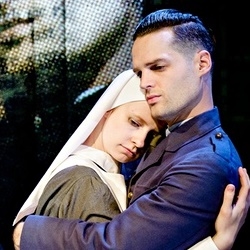Andrew Quick, Pete Brooks and Simon Wainwright chat about A Farewell to Arms
There seems to be a curious alchemy to the way the three of you create work.

© Ed Waring
SW: The three of us find that when we are in a space together we make something that we wouldn’t make in any other way. Writing, directing, technology, visuals, and it is stressful and messy at times and that’s what people who work with us would say but I think the work that we have made apart hasn’t been the same as when we are together throwing things at the wall.
So why A Farewell to Arms?
AQ: Part of it is pragmatic; part of it is an interest in Hemingway.
SW: It comes back a bit to themes. Two young people in a pretty extreme situation – war – and that’s been a theme in a lot of our work in the last few years.
PB: All of this is driven by personal things and this is really connected to previous work. We are connected to the world. With the First World War anniversary, we were looking at the way in which that event was being commemorated. We’re interested in this idea that the book isn’t really about the First World War. It was written in 1927 and it’s a symbolic novel about the fact that the future isn’t looking too good.
How did you go about getting a script you could work from?
AQ: Well the book is the book and that’s the basis of the script. Of course it’s been cut down but we are not re-writing Hemingway. In some way’s we are staging a reading of the novel – or rather, what it’s like to read a novel and all that you bring to the process of reading.
These big themes are something you can tackle because of the nature of the company?
PB: One of the great things about working with an ensemble company is that we are answering questions that we started asking two shows ago. Really what you do is pick up unresolved business from the last project. I think we are lucky in the way we work. We only do what we want to do and it’s a developing body of work and in a way we come back to the same themes and characters. We have a guy called Harry Kellerman who appears in all our work, in different situations, he is our everyman. When you’re working the way we do, you are creating your own symbolic world. You don’t sit down and go right we’re going to write about this theme again, that just happens.
A Farewell to Arms is at the Lowry from 13 – 15 November.










